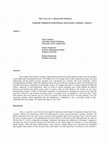Papers by Fabrice Desmarais
This chapter provides an overview of the advertising self-regulation system in New Zealand. It di... more This chapter provides an overview of the advertising self-regulation system in New Zealand. It discusses the arguments for and against self-regulation, the status and objectives of the advertising standards authority, the advertising codes of practice and the place of legislation in the codes. It describes the complaints and appeals board and explains the complaints process, discussing the importance of taking into account spirit, intention and audience before reaching decisions. The chapter also discusses cross border, statutory, and cultural issues as well as new developments in self-regulation in online and mobile advertising.

Journal of Global Marketing, 2014
ABSTRACT Little advertising research explores the role of culture in selecting celebrity endorser... more ABSTRACT Little advertising research explores the role of culture in selecting celebrity endorsers. The purpose of this study is to explore how the selection process of athlete endorsers is shaped by national contexts. Based on interviews with advertising practitioners in 10 countries, the study reveals similarities in practitioners’ thinking across countries on a variety of matters related to athlete endorsement. It reveals the importance given by practitioners to the “cultural attractiveness” of national athlete endorsers when using them to connect with their national audience and shows that the selection process depends greatly on various cultural pressures linked to sporting traditions of each country. The study also shows how practitioners believe that athlete endorsers should be used mainly to generate brand and advertising awareness principally under pressure from clients’ emotional input.
Humanistic Marketing, 2013
ABSTRACT This chapter provides an overview of the French advertising environment and of the attem... more ABSTRACT This chapter provides an overview of the French advertising environment and of the attempts of some participants to build a more sustainable and responsible industry. The chapter presents an insider account of a relatively new breed of ‘responsible’ agencies that have placed strong sustainable development principles centrally in their mission. The chapter explores the motivations and practices of these agencies and uncovers a range of internal and external issues faced by them. Overall these agencies see their role as educating and accompanying their clients towards a better understanding of and attitude towards sustainable society issues, and also to deliver messages to consumers that are compatible with these issues.
Public Relations Review, Jan 1, 2008
Journal of Language and Social …, Jan 1, 2010
Media International Australia, Incorporating …, Jan 1, 2000
ABSTRACT Includes bibliographical references (leaves 317-360) Thesis (Ph.D.)--University of Waika... more ABSTRACT Includes bibliographical references (leaves 317-360) Thesis (Ph.D.)--University of Waikato, 2003.
International …, Jan 1, 2009
Prism Online Journal, Jan 1, 2007
Tourism and gender: embodiment, sensuality …, Jan 1, 2007
Advertisements as Tourism Space:'Learning'Masculinity and Femininity from New Z... more Advertisements as Tourism Space:'Learning'Masculinity and Femininity from New Zealand Television FABRICE DESMARAIS Introduction There is now an extensive literature on tourism advertising, much of it focusing on the role of advertising in promoting destinations: ...
Conference Presentations by Fabrice Desmarais

The weight of the political economy of globalisation and business and commercial innovation has r... more The weight of the political economy of globalisation and business and commercial innovation has reframed social capital and citizenship discourses. The blanket role of sovereign states in their national governance has been undermined, and the global economy generates new expectations for economic and social citizenship. Critical Cosmopolitanism (Delanty, 2006) and complexity theory are used to discuss emergent scenarios of transformation in personal and business commitment in knowledge societies. We suggest that there is a deeper simplicity beneath the surface complexity of such phenomena. There are however various spiralling issues which amplify the dialectic between post-national and global across micro to macro scales in both business and society. At one level, homogenising, narrative schema of the global community of commitment is emerging as a macro-level script for survival as coherent or pre-eminent, sovereign entities. At another level, the interplay of ‘self’ and ‘other’ within both business and social relations can be viewed as a fractal of the global and local; core and periphery. The self-organising dynamic which destabilised the old equilibrium is amplifying











Uploads
Papers by Fabrice Desmarais
Conference Presentations by Fabrice Desmarais